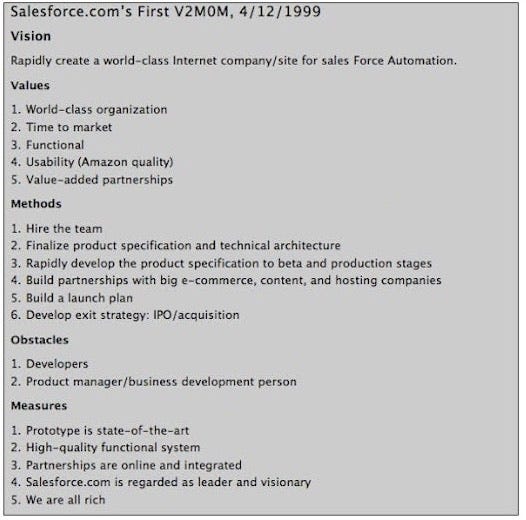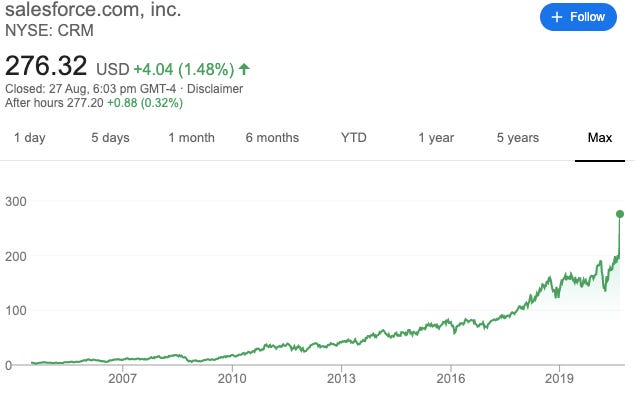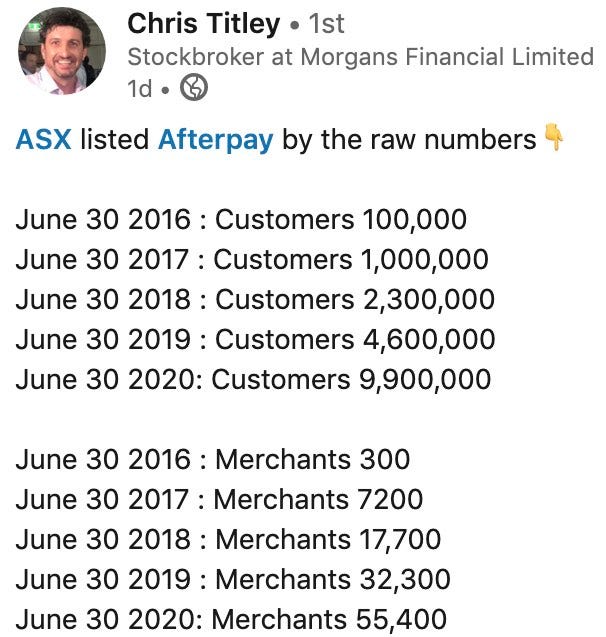Weekly Wrap #17: Salesforce Blazes, Everyone Lists, Bosses Quit
Welcome to our Weekly Wrap, where we cut through the noise to bring you our favourite insights from the technology and startup world.
Please keep the great feedback coming. If you love the Weekly Wrap, share away.
The SaaS OG (Original Gangster)
This week Salesforce passed US$5B in quarterly revenue, beating its $20B annual run rate target by 2 years. An outstanding milestone.
Founded in 1999, launched in 2000 and listed in 2004, Salesforce is the pioneer of the online software subscription model. Its CEO Marc Benioff is known to many as the Godfather of SaaS.

So what has Salesforce done well to get here?
Communications strategy - alignment
Benioff coined the framework V2MOM. It enables the company’s 54,000+ workforce to understand the company’s purpose and direction to guide action and decision making.
The V2MOM enables me to clarify what I’m doing, and then communicate it clearly to the entire company. It boils down to these five questions, which create a framework for alignment and leadership:
Vision— what do you want to achieve?
Values — what’s important to you?
Methods — how do you get it?
Obstacles — what is preventing you from being successful?
Measures — how do you know you have it?
Check out Salesforce’s first V2MOM, which references Amazon’s usability - still an aspiration for many organisations 21 years later:

Source: Salesforce
Benioff is also a master of simple, consistent messaging. Salesforce Ohana (its workforce), Dreamforce (its annual conference), Trailblazers (its community) and Trailhead (its learning platform) are all examples of Salesforce lexicon that is used consistently, and serves to align and evoke emotion.
Purposeful messaging even flows through into its ticker code. While most companies have a ticker that is an abbreviation of their name, Salesforce took an entirely different approach with $CRM. Atlassian followed suit with $TEAM and Slack with $WORK.
Platform strategy - enable an ecosystem
In 2006, Salesforce launched AppExchange, the first app marketplace. A platform for custom applications, Force.com soon followed in 2007. The platform concept revolutionised software distribution and played a fundamental role in securing Salesforce’s dominance in the market.
A number of high-growth companies have been built off the back of the Salesforce platform. One example is nCinco, a bank operating system, that went public last month.
This strategy was possible because Salesforce had a clear, focussed product vision. With limited resources and a relentless mission to build excellent product, Salesforce knew it couldn’t be all things to all people from the outset. Instead, it focussed on the core product and eventually created an environment where a valuable ecosystem could grow around it.
Benioff credits his mentor Steve Jobs for planting the seed for Salesforce’s AppExchange. The tale goes that Jobs told Benioff that in order to grow 10x he needed to develop a cloud software ecosystem. With this always on his mind, a couple of years later the idea of an app store came to Benioff. He had lawyers register the domain appstore.com and trade mark AppStore.
The term “Store” didn’t resonate with customers, so the Salesforce marketplace was eventually launched under the brand AppExchange and AppStore lay dormant… until Jobs announced Apple’s own marketplace years later, prompting Benioff to gift Apple the rights to “AppStore”.
Acquisition strategy - foresight
Salesforce has been busy acquiring companies for some time. In 2016 alone, Salesforce spent $5B acquiring 12 companies to build out the platform’s “Einstein” AI capabilities. Over the last few years the focus has been on data - acquiring Tableau for a whopping $15.7B and MuleSoft for $6.5B.
Doing a deal is one thing. Ensuring the acquisition is successful years down the track is quite another. Salesforce seems to have the magic formula for getting this right.
Salesforce also has the second most active Corporate VC in the world, Salesforce Ventures, which has 455 investments and 90 exits to date. Its portfolio includes Stripe, DocuSign, Box, Bugcrowd, Snowflake, Dropbox, Hubspot and Zoom. Athena, Airwallex, Autopilot and GO1 are examples of investments here in Australia.
#Trailblazers

Wouldya look at that pop!
Filing fiesta
It’s official! We’ve just experienced the biggest week of public listing announcements and filings in history.
Well, that might be an exaggeration - we haven’t done any formal analysis. But there is no denying that this week has been HUGE in the world of listings.
A sample of this week’s activity (all figures in USD):
Ant Group (FinTech behind Alipay) filed to go public. The payments affiliate of Alibaba confirmed it is looking to raise a record $30B and list on the Hong Kong and Shanghai stock exchanges by October, which could value the company at around $200B. If successful, it’ll be the biggest IPO the world has ever seen.

XPeng a Chinese electric vehicle company listed on the NYSE and raised $1.5B under its IPO.
Doordash confirmed its plans to IPO in Q4. It has been a big few months for food delivery - Just Eat Takeaway announced it would acquire Grubhub for $7.3B in June, and Uber Eats announced a deal to acquire Postmates for $2.65B in July. Incidentally, that reminds us of one of Australia’s best tech M&A deals. In 2015 Australia’s #1 (Menulog) and #2 (EatNow) food delivery startups merged. A few months later, the merged entity was acquired by Just Eat for a mind-blowing $687 million!
Monday saw an S-1 filing fiesta. These companies ALL filed to list on U.S. stock exchanges: Snowflake (cloud data storage), Sumo Logic (“continuous intelligence platform”), JFrog (Israeli DevOps platform for Continuous Software Release Management), Unity (gaming engine), Amwell (telehealth) and Corsair (gaming hardware company) and Asana (productivity tool).
Following in the footsteps of Slack and Spotify, Palantir filed for a direct listing (as did Asana mentioned above) i.e. they’ll just list with no public capital raise, which:
allows existing shareholders to sell down immediately rather than being locked up for a period, as convention usually requires with IPOs;
avoids costly investment banking fees, which usually take 4-7% of an IPO’s proceeds; and
ensures a fairer listing price based on electronic auction by the stock exchange. First-day IPO pops can suggest underpricing by banks.

Of course, this follows some recent successful tech listings, including BigCommerce and Lemonade. Tech stocks are hot right now as the pandemic sees us shift further online for our work, life and play.
You just need to glance at the Bessemer Venture Partner Cloud Index to see why investors and unicorns alike consider this a great time to list.

Bonus read: Pitchbook's Index of Venture-Backed IPOs for Q3 2020 is out.
Rapid fire: Things that caught our eye this week 🧐
Taking a leaf out of Apple’s vertical integration playbook, Xero is acquiring Sydney-based business lending startup Waddle for AU$80M.
Justin Lipman from Sydney-based VC EVP released an excellent overview of recent AU/NZ early stage startup performance.
Afterpay released its results showing some extraordinary growth. Customer and merchant growth rates are starting to slow, though:

Chris’ post above led us to this Gold Coast bootstrapped gem - Desygner, a competitor to Canva. And reminded us of this post by angel investor Alan Jones - “Why does the media only care about my startup raising money?…”
Our next few points don’t help this problem, sorry!
Aussie-founded music rights marketplace startup Songtradr raised US$30M Series C led by St. Baker family office.
Logistics startup Ofload raised AU$2.8M led by global transport giant Maersk’s venture arm. The startup aims to address the wastage in the road freight industry - around 30% of trucks in Australia are running with empty loads!
Melbourne-based Socialsuite raised AU$1.5M led by Tidal Ventures and Salesforce Ventures. Socialsuite helps companies measure and monitor social impact. In 2018 the team won US$100k from a Salesforce pitch competition.
Seek’s ex-MD Americas Tennealle O'Shannessy is the new CEO of Adore Beauty as it prepares to list.
Envato CEO Collis Ta’eed will step down at the end of the year. Envato’s 600+ staff will receive a 20% profit-share this year worth AU$3.75 million. <- The benefit of being a bootstrapped company without shareholders to answer to.
TikTok’s new boss calls it quits. Ex-Disney exec, Kevin “this isn’t what I signed up for” Meyer has resigned just over 100 days since joining. Australian Vanessa Pappas is interim CEO.
In the latest TikTok acquisition rumours, SoftBank has been named as a potential buyer, as has Netflix. Microsoft still appears to be the front runner and is in talks with Walmart for a partnership. Another report suggests Oracle is getting close to sealing a deal.
That’s a wrap! We hope you enjoyed it.
Don’t forget it’s Fathers Day next Sunday. And because it’s 2020 you can organise everything without leaving the couch. Support small Victorian businesses by finding a present via the Click for Vic campaign. Also, check out Aussie startup Cardly - they print and post bespoke cards on your behalf. You can even add doodles!
Gavin, Bex and the team at Ignition Lane
p.s. We love feedback - if you have any or want to continue the conversation, please reach out.
p.p.s. Watch Gavin live on AusBiz at 2pm on Mondays, when he opens the Startup Hour of Power.

